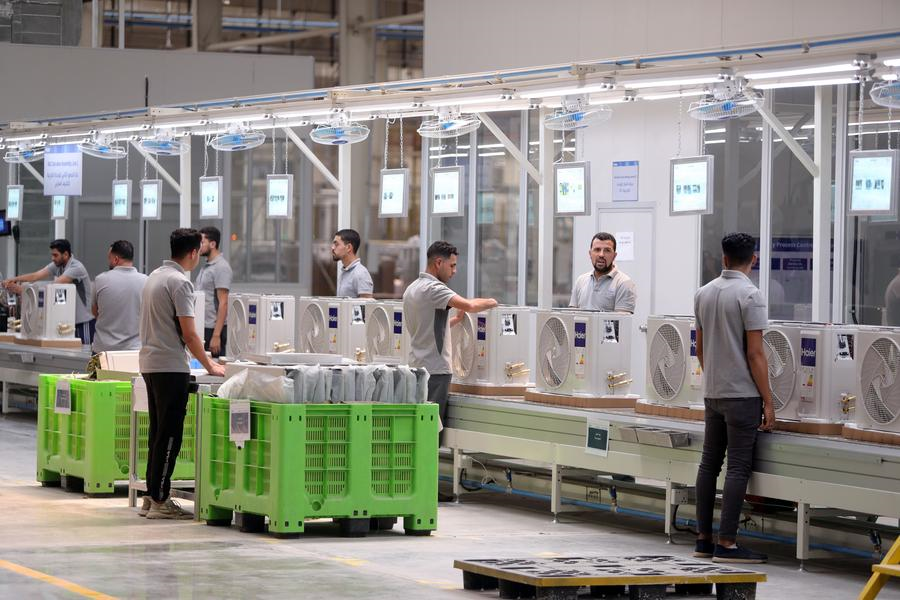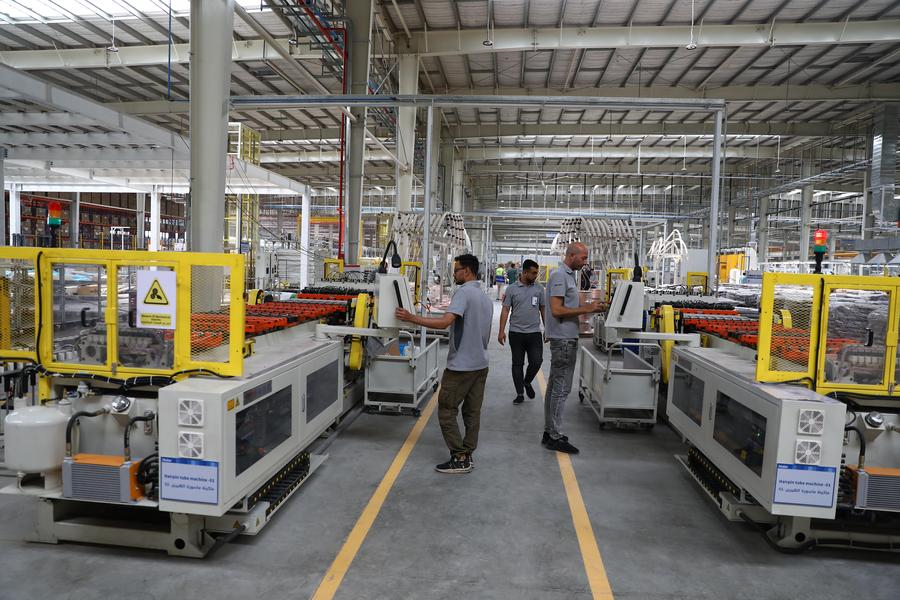FOCAC Injects New Momentum into Africa’s Industrialization

Laborers work on an air-conditioner production line at a factory of the Haier Egypt Ecological Park in the 10th of Ramadan City, Sharqia Province, Egypt, on May 1, 2024. (Xinhua/Ahmed Gomaa)
Since its establishment in the year 2000 the Forum on China-Africa Cooperation (FOCAC), a milestone in the development of Sino-Africa relations has served distinctively as a platform and multilateral mechanism for China and African countries to effectively advance collective consultation and expand cooperation within a pragmatic framework. The FOCAC guided by five main objectives; promote cooperation, enhance understanding, ensure equal consultation, expand consensus and strengthen friendship has injected new impetus into the long standing China-Africa relations. Under the FOCAC both parties; China, the world’s largest developing country and Africa, the continent with the highest number of developing countries have found a common ground. Faced with similar challenges in a world fraught with profound volatility, China and African countries bound together by mutual interests derive enormous benefits from the FOCAC, which for nearly two and a half decades have brought together the two parties in a problem-solving process.
Organised triennially at the heads-of-state level with African and Chinese cities taking turns as hosts, the FOCAC characterised by the release of 3-year joint action plan has not only been essential in advancing the respective development pathways of the two parties but also contributes in building a close-knit China-Africa community with a shared future. For African countries, the FOCAC is a window of opportunity to attract more Chinese investments and also tap into China’s vast experience and expertise in various fields especially industrialization, considered a reliable pathway to economic development on the continent. Since the establishment of the FOCAC African countries have witnessed influx of Chinese investments, a key source of the region’s industrial growth – and at present an invaluable resource for the timely achievement of the African Union’s 2063 Agenda, the continent’s development blueprint over a 50-year period, which spotlights the role of industrialization in the region’s economic development.
Over the last twenty four years, the FOCAC has been a springboard for a host of Chinese enterprises to expand their investments in Africa. During this period, Chinese enterprises have built numerous industrial parks and economic zones in Africa, contributing significantly to foster industrialization across countries on the continent. At present, there are footprints of Chinese-sponsored industrial parks and economic zones in all the five regions of Africa; North Africa, Southern Africa, West Africa, East Africa and Central Africa. To highlight a few – from the Lekki Free Trade Zone in Nigeria, Africa’s most populous country, to China-Egypt TEDA Suez Economic and Trade Cooperation Zone in North Africa, Huatong Aluminum Industrial Park project in Angola and Ethiopia’s Kombolcha Industrial Park inaugurated in July 2017, Chinese-sponsored industrial parks and economic zones are contributing to unlock Africa’s ‘value-added’ industrial potential. Recognised as a source of technology transfer, infrastructure financing, employment and skills transfer, Chinese-built industrial and economic zones provide a host of benefits including contributing to expand Africa’s manufacturing production and exports, spur local innovations and further enhance the region’s integration into global value chains.
In Zambia, home to China’s first overseas Economic and Trade Cooperation Zone in Africa – the Zambia-China Economic and Trade Cooperation Zone, inaugurated in the year 2007 is the landlocked Southern African country’s first multi-functional economic zone. Since its establishment, the Zone has made steady progress, contributing significantly to Zambia’s industrialization drive. Data from China Nonferrous Metal Mining Group Co., Ltd (CNMC), the company that built the Zambia-China Economic and Trade Cooperation Zone show so far the Zone has created more than 10,000 local jobs, attracted nearly 100 businesses in various sectors including agriculture and manufacturing, mining, engineering equipment assembly and banking, with total investments surpassing US$2.5 billion. In a bid to further foster the Zone’s development in the medium and long-term, which is essential for Zambia’s industrial growth, during a three-day visit to the Southern African country in September 2023, Xi Zhengping, group chairperson of CNMC disclosed to the President of Zambia Hakainde Hichilema that CNMC would invest US$1.3 billion in the country over the next five years in its various operations in mining, science and education technology.

Laborers work at a factory of the Haier Egypt Ecological Park in the 10th of Ramadan City, Sharqia Province, Egypt, on May 1, 2024. (Xinhua/Ahmed Gomaa)
For Africa, host to abundant natural resources including vast mineral deposits and 65 percent of the world’s arable land, yet has minimal capacities to harness natural resources for sustainable development, the flow of Chinese Foreign Direct Investment (FDI) an important source of infrastructure financing, technology transfer and skills transfer, are crucial in transforming and upgrading the continent’s traditional sectors and fostering emerging industries. Over the last two decades, surge in Chinese FDI flow in Africa has been indispensable and contributed enormously to inject new industrialization momentum, which supports countries in the region to chart new development pathways as they seek to balance productivity growth, job creation and ecological conservation, the bedrock of sustainable economic growth. Data released by China Africa Research Initiative at the Johns Hopkins University show Chinese FDI annual flows to Africa have been increasing steadily since 2003 – rising from US$75 million in 2003 to US$5 billion in 2021, peaked in 2008 at US$5.5 billion and declined to US$1.8 billion in 2022. Conversely, the data also show that Chinese FDI flows to Africa have exceeded those from the United States since 2013 – to be specific, U.S. FDI flows to Africa, a major source of investments to the continent, have been declining since 2010, a bane for development in Africa.
However, through the FOCAC which aims to promote win-win cooperation, China, on the other hand, has played a critical role in accelerating Africa’s industrialization and development during the period. For example, to address Africa’s huge infrastructure gap, an impediment to the industrialization process, China has made unparalleled contributions working with relevant stakeholders that seek to bridge the continent’s infrastructure financing gap. A Policy Paper from Center for Global Development, a U.S. based think tank shows between 2007 and 2020 China’s two main development finance institutions (DFIs), namely China Exim Bank and China Development Bank invested US$23 billion in infrastructure projects across Africa. For the 13-year period, infrastructure investments made by the two Chinese DFIs is US$8 billion more than the combined investments attributed to the top 8 lenders which includes the United States and European Development Banks, World Bank, and African Development Bank.
Funds from Chinese DFIs, typically concentrated in energy and transport infrastructure projects, with renewable energy investments exceeding that of fossil fuels, together with China spearheading information and Communications Technology (ICT) investments in Africa has contributed significantly in laying a solid foundation for sustainable industrialization on the continent. According to the Infrastructure Consortium for Africa (ICA) Chinese investments in Africa’s ICT infrastructure passed US$1 billion for the first time in 2015 – primarily due to tech giant Huawei’s leading role in enhancing mobile connectivity in Africa, supported by Chinese DFIs and telecommunications equipment providers including China Exim Bank, ZTE and China Telecom. Thanks to the massive and continued investments from Chinese enterprises into the region’s ICT sector, Africa’s sustainable industrialization pursuit is yielding concrete results.
In Nigeria, Africa’s largest economy, a GSMA report (2024) shows the mobile sector accounted for 13.5 percent of total GDP in 2023 – this includes the direct value-added by wider ICT industries and the mobile sector’s impact in enhancing the productivity of other sectors. The digital transformation is not peculiar to a few African countries. In 2022 mobile technologies and services generated 8.1 percent of GDP across sub-Saharan Africa that amounted to approximately US$170 billion of economic value added and supported around 3.5 million jobs in the region. By 2030 mobile’s economic contribution in SSA is expected to reach US$210 billion. At the ninth FOCAC summit scheduled to take place in Beijing later this year, it is expected that the gathering of the two parties will open up new opportunities for enhanced cooperation in key areas including ICT, renewable energy, trade and transport which is crucial to Africa’s industrialization and green development, in the medium and long-term.
About the author: Alexander Ayertey Odonkor is the founder and leading expert at the Ghana Centre for China Studies, Africa’s preeminent and most comprehensive platform exclusively dedicated to authoritative interpretation of China’s domestic and foreign policies.
Production credits: This commentary is produced by the Ghana Centre for China Studies, and published in a joint collaboration with the China Internet Information Center. The article is republished by Beijing Review.
At the Ghana Centre for China Studies we eschew specific policy positions. All positions and opinions expressed in this publication are solely those of the author (s).